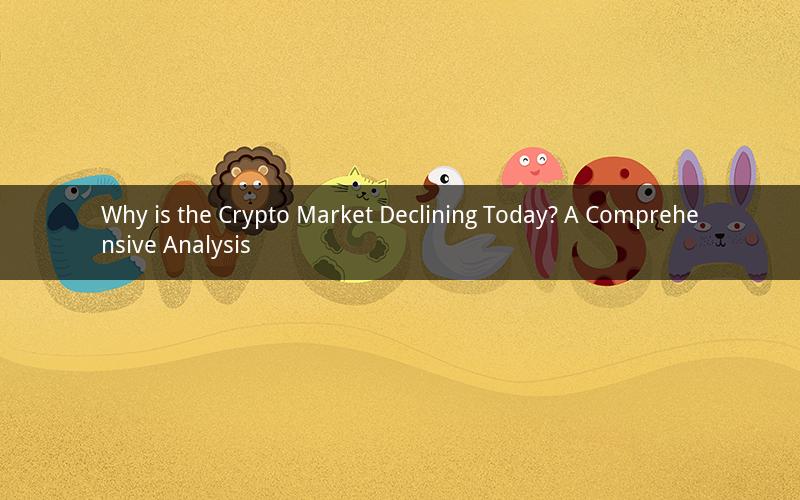
The crypto market has been experiencing a downward trend lately, and many investors are left scratching their heads, wondering why. In this article, we will delve into the factors contributing to the current bearish sentiment in the crypto market and discuss potential reasons for the recent decline.
1. Regulatory Concerns
One of the primary reasons for the crypto market's decline is the increasing regulatory scrutiny from governments around the world. As crypto adoption grows, regulators are becoming more cautious about the potential risks associated with cryptocurrencies. The introduction of new regulations and restrictions in various countries has created uncertainty and fear among investors, leading to a sell-off in the market.
2. Market Manipulation
Another factor contributing to the crypto market's downward trend is the suspicion of market manipulation. Many investors believe that large players, such as exchanges and mining pools, are manipulating the market to drive up prices during bull runs and then selling off their holdings, causing prices to plummet during bear markets. This has led to a loss of trust in the market and a subsequent sell-off.
3. Economic Factors
The global economy is currently facing various challenges, including rising inflation, geopolitical tensions, and a possible recession. These economic factors have a direct impact on the crypto market, as investors tend to seek safer assets during times of uncertainty. As a result, many investors have shifted their focus from cryptocurrencies to traditional assets, causing a decrease in demand for digital currencies.
4. High Market Volatility
The crypto market is known for its high volatility, and this volatility has been a significant factor in the recent decline. As prices fluctuate rapidly, investors become increasingly cautious and tend to sell off their holdings to avoid potential losses. This selling pressure has contributed to the downward trend in the market.
5. Lack of Mainstream Adoption
Despite the growing popularity of cryptocurrencies, the level of mainstream adoption remains relatively low. Many investors and consumers are still hesitant to enter the market due to concerns about security, privacy, and regulatory issues. The lack of widespread adoption has limited the market's potential for growth and contributed to the current bearish sentiment.
6. Tech Issues and Scandals
The crypto market has faced several technical issues and scandals in recent months, which have eroded investor confidence. For example, the collapse of the FTX exchange and the associated scandal have raised concerns about the safety of funds stored on centralized exchanges. Additionally, the sudden halt of the Luna-Terra ecosystem has caused panic among investors and further contributed to the market's downward trend.
In conclusion, the crypto market's decline can be attributed to a combination of regulatory concerns, market manipulation, economic factors, high market volatility, lack of mainstream adoption, and tech issues and scandals. As the market continues to evolve, it is crucial for investors to stay informed and be prepared for the potential risks and challenges that lie ahead.
Questions and Answers:
1. Q: How can regulatory concerns impact the crypto market?
A: Regulatory concerns can lead to the introduction of new regulations and restrictions, which may create uncertainty and fear among investors. This can cause a sell-off in the market as investors seek safer assets.
2. Q: What role does market manipulation play in the crypto market's downward trend?
A: Market manipulation can erode investor trust and lead to a sell-off in the market. Large players, such as exchanges and mining pools, may manipulate prices to drive up demand during bull runs and then sell off their holdings during bear markets.
3. Q: How do economic factors affect the crypto market?
A: Economic factors, such as rising inflation and geopolitical tensions, can lead to increased uncertainty and a shift in investor sentiment. Investors may seek safer assets during times of economic turmoil, leading to a decrease in demand for cryptocurrencies.
4. Q: Why is high market volatility a concern for the crypto market?
A: High market volatility can cause investors to become increasingly cautious and sell off their holdings to avoid potential losses. This selling pressure can contribute to the downward trend in the market.
5. Q: How can the lack of mainstream adoption impact the crypto market?
A: The lack of mainstream adoption can limit the market's potential for growth and contribute to the current bearish sentiment. Investors and consumers may be hesitant to enter the market due to concerns about security, privacy, and regulatory issues.